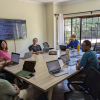Avoiding political entanglement or embedding justice in politics? Are we asking the right questions?
By Nora Stel | Research fellow at Maastricht School of Management,and PhD candidate at Utrecht University’s Center for Conflict Studies. She is an affiliated scholar at the American University of Beirut’s Issam Fares Institute for Public Policy and Foreign Affairs.
Questions concerning the political economy of justice in fragile contexts and the development community’s engagement with it are as pertinent as ever. It is, however, quite often the wrong questions that are being asked. At its Annual Conference on 24 June 2015, the Knowledge Platform for Security and Rule of Law observed that‘Interventions often seek to steer clear of politics, as this often raises difficult questions regarding legitimacy and elite involvement’, and that ‘Security and Rule of Law programming is, therefore, often presented and undertaken as a purely technical endeavor.’ It consecutively asks whether such neutral interventions are in fact ‘realistically possible.’

The answer to this inquiry, as analysts and practitioners will widely underwrite, is a straightforward ‘no.’ All development interventions, and those related to justice, security and rule of law arguably even more so, are per definition political and hence entangled or embedded in existing political economies. Nor is this unequivocally a bad thing. A research project investigating local security arrangements in Beirut, Lebanon, that was recently piloted under the Platform, for instance, found that the political parties often blamed for inciting instability and insecurity on a national level simultaneously gave substance and durability to neighborhood-level security and justice assemblages.
The really significant question, then, is not whether purely technical or ‘neutral’ interventions are possible but whether they are desirable. Having a theory of change, the single most indispensable asset of any organization seeking to intervene in fragile settings these days, in fact implies the exact opposite of political neutrality. To aspire for change is inherently normative and political. Dealing with non-state, undemocratic or (semi-)criminal elites is often feared to grant them undue legitimacy. Yet, not engaging with the political economy at hand in reality mostly boils down to little more than reinforcing the status quo too. This, as a recent working paper for Yale University demonstrates for Palestinian refugees in South Lebanon, risks further marginalizing already vulnerable groups such as refugees and residents of informal settlements – the very communities whose access to justice our interventions seek to enhance.
Embracing the inevitability of dealing with politics allows for a shift from ‘entanglement,’ with its negative and passive connotations, to ‘engagement,’ which has rather more positive and active undertones. It is the how of such engagement, rather than the if, that then merits contemplation. But where to start? Whereas social and political scientists are taught that positionality is the vantage point of any analysis, such reflexivity is less routinely practiced on an institutional level. Nevertheless, in designing and implementing justice and security related interventions in fragile contexts explicating one’s own values, norms, ethics and theories of change might very well be the most straightforward starting point for engaging with the intervention’s political context and for outlining interactions with partners and brokers.
Moreover, acknowledging the political reality of the intervener and the intervention brings to the fore a meta-reality that the development community often conveniently ignores: time and again, interventions ‘fail’ not because of a lack of quality or quantity of programs, policies or even knowledge but because of a lack of political will. Political entanglement is not something any intervention can opt to avoid. But the recognition that the interests of both elites, in the context of the intervention, and donors, in the context of the intervener, will overrule most designs and programs and many lessons learned can at least make our theories of change more grounded and realistic. This insight does not only have implications for interventions in the public sector, but, as evidenced in an IZA working paper on ‘public-private entanglement’ in Lebanon, also resonates for private sector development and entrepreneurship in fragile settings.







Login or register for free to get all access to our network publications. Members can also connect and discuss with other members. Participate in our network.